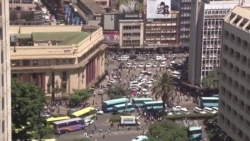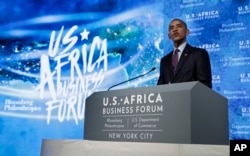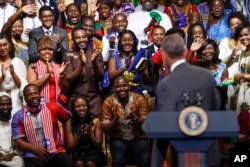When Barack Obama was elected U.S. president in 2008, the event was hailed across Africa. He is the son of a Kenyan, after all, and many on the continent considered Obama one of their own.
So Africans' hopes were high when he took office. Perhaps too high, suggests Kenyan political commentator Barrack Muluka.
"If we in Africa were looking up to him, to come with a magic wand to solve our problems, then I think our expectations were misplaced," said Muluka. "He was not the president of Africa. He has been the president of the United States of America, elected by American citizens, and his foreign policy will be governed first and foremost by American interests."
Muluka argues that because Obama was hindered by frequent questions about his birthplace, especially during his first term in office, he couldn't be perceived as favoring the continent, and therefore did not do as much as he might have otherwise.
But as president, Obama made four trips to sub-Saharan Africa, visiting six countries. He challenged African governments on issues like human, LGBT and women's rights.
He set the tone during his first visit in 2009, to Ghana, when he challenged some African leaders.
"Now, make no mistake: History is on the side of these brave Africans, not with those who use coups or change constitutions to stay in power," Obama said. "Africa doesn't need strongmen. It needs strong institutions."
Trade, not just aid
A highlight of his Africa foreign policy has been his emphasis on trade, not just aid.
"I think President Obama built a framework for the U.S. corporate sector to get engaged with Africa by consistently engaging through the business councils and so forth," said Aly-Khan Satchu, a Nairobi-based financial analyst. "It sort of 'de-risked' Africa in a lot of U.S. corporate minds. And I think that was an important achievement that the president made."
Obama also made a point of addressing African youth, a group he focused on throughout his time in office.
"When it comes to the people of Kenya, particularly the youths, I believe there is no limit to what you can achieve," Obama said during his state visit to Kenya in July 2015.
And Obama's message of hope to Africa and its young people may be what defines his legacy here.
"He's shown Africa a higher path, and I think he's done this generally. That's been his politics," Satchu said. "He's always lifted people's heads up and said, 'Look where you can go.' "
Obama launched the Young African Leaders Initiative in 2010 to help promising young people across the continent prepare for leadership positions. More than 250,000 people have joined the YALI network, and 1,000 fellows attended leadership programs at U.S. colleges and universities in 2016.
In 2013, he launched the Power Africa initiative, to try to double access to electricity across sub-Saharan Africa. Obama's legacy also includes increased military support in Somalia to fight al-Shabab, and in Cameroon and Chad to tackle Boko Haram, as well as his intervention in Libya. The latter was part of the NATO-led, multistate military intervention, a response to events during Libya's civil war in 2011.







